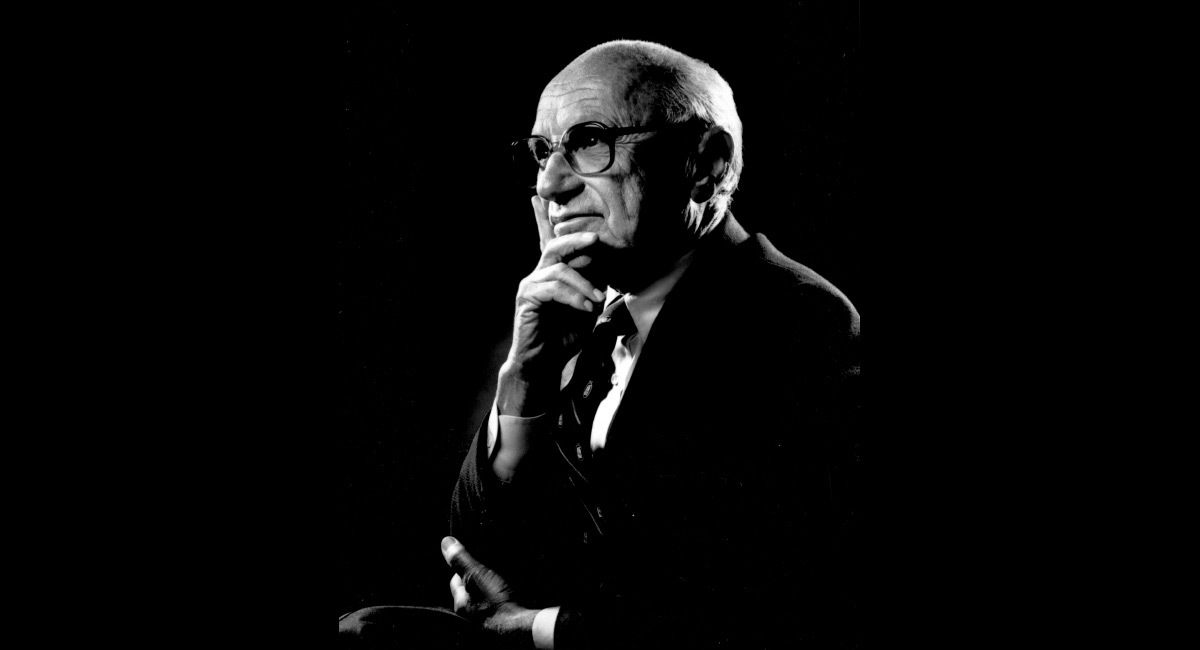Any list of the most influential thinkers of the last century should include the famous University of Chicago economist Milton Friedman (1912-2006), who is the subject of the latest installment in the Fraser Institute’s Essential Scholars series.
In the series’ (short) volume on Friedman, the economist Steven E. Landsburg—a master of clear, concise, example-driven exposition—introduces readers to some of Friedman’s most important ideas. The book consists of short chapters on the permanent income hypothesis, money, monetary policy, monetary history, unemployment, “Chicago Price Theory,” his landmark 1962 book Capitalism and Freedom, his policy activism, and his and his wife’s contributions to civil discourse.
It is amazing, when you think about it, that Friedman accomplished and contributed so much. He was honored with the John Bates Clark Medal, bestowed on the for best economist under age 40 by the American Economic Association, in 1951. Most of the ideas in The Essential Milton Friedman—and most of the ideas for which Friedman is justly famous—were developed after he had won the Clark Medal.
Friedman made path-breaking contributions to technical economic analysis, but he took his understanding beyond the seminar room and into the pages of Newsweek (he wrote a column for them that appeared every three weeks for almost two decades) and onto TV screens around the world with his PBS series Free to Choose (and the accompanying book). He was a passionate, articulate, and (importantly) patient defender of free markets who would engage, it seemed, with virtually any challenger at virtually any level. His enthusiasm for economic freedom—which the Fraser Institute works to measure empirically—has earned him quite a bit of wrath and vituperation from those who do not share his vision. I agree with Landsburg—and Harvard University’s Andrei Shleifer—that the empirical record has largely vindicated him: “The Age of Milton Friedman” has been accompanied, by and large, by improving economic conditions around the globe, and it is at least plausible to think that Friedman’s contributions deserve at least some credit for several decades of low inflation and, in the 2010s, the first decade in American history without a recession. Here is Landsburg:
“There is, of course, a great deal of controversy about whether the Federal Reserve governors did too little or too much in 2008, and about whether they did those things in the best possible way, or in one of the worst possible ways, or somewhere in between. But they clearly understood that it was their mission not to repeat the mistakes of the Depression, and they were able to fulfill that mission because Milton Friedman and Anna Schwartz had done the hard work of discovering, documenting, and explaining to the world what those mistakes had been.”
The Essential Milton Friedman is an easy read that will make some of Friedman’s sometimes-counterintuitive ideas easy for even non-specialists to understand. The accompanying website includes supplementary videos that explain his ideas and that I plan to use in my courses. The price is right, too: at $0 for the PDF, it’s worth a download.
Disclosure: I have done paid work for the Fraser Institute in the past but have received no valuable consideration from them for this article. Here is a talk I gave at the invitation of the Nassau Institute on the occasion of what would have been Friedman’s 100th birthday in 2012.









